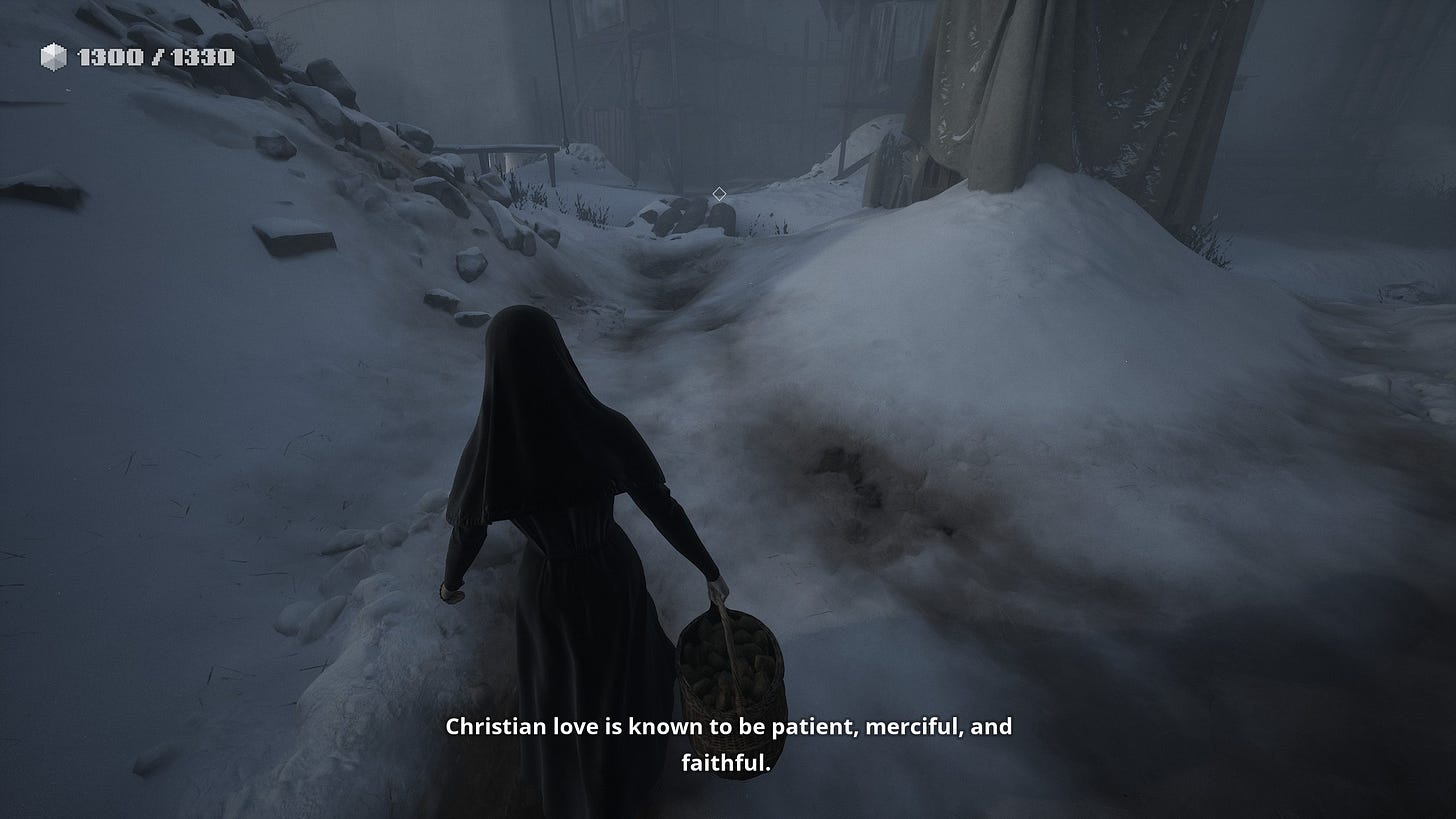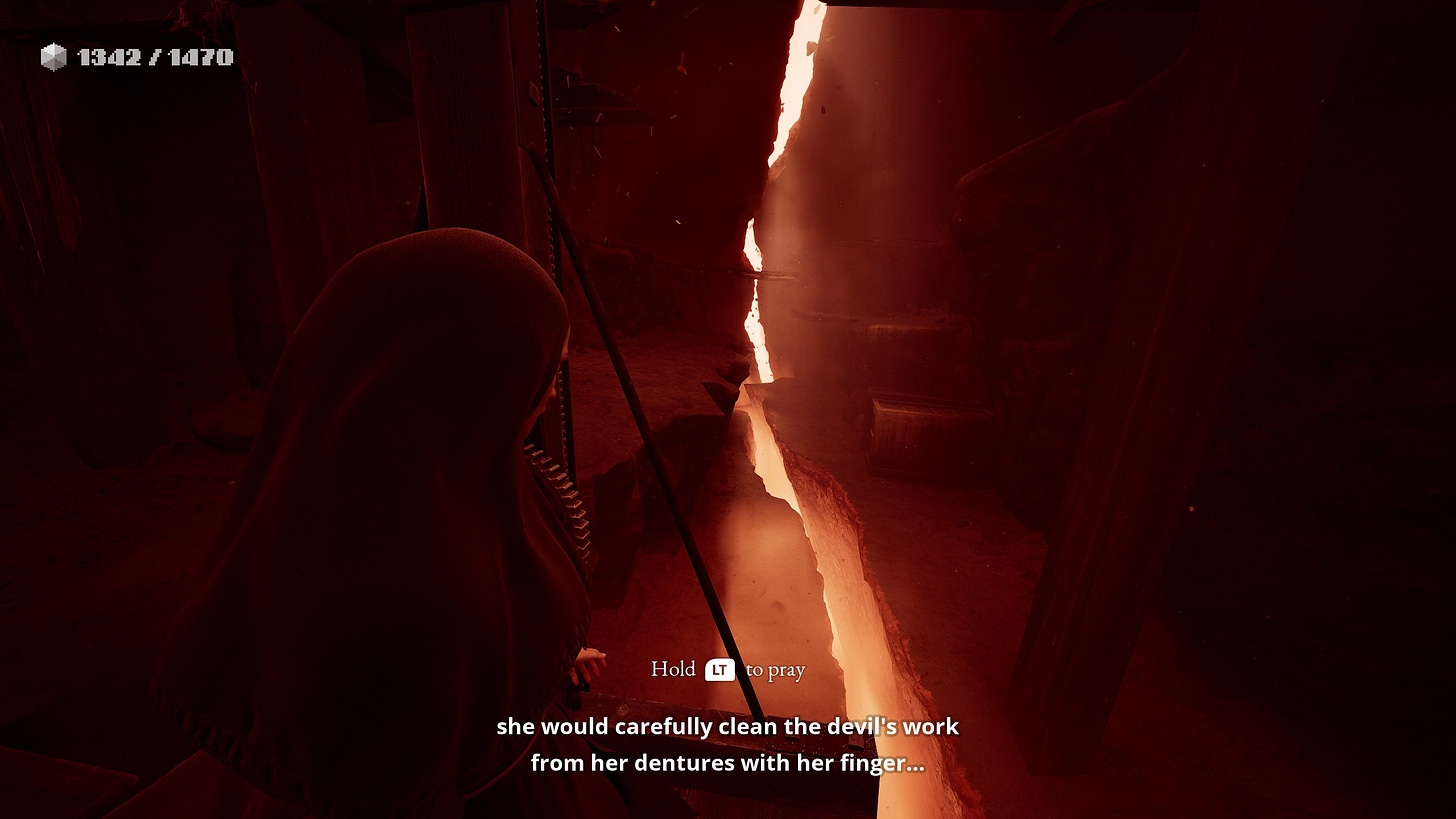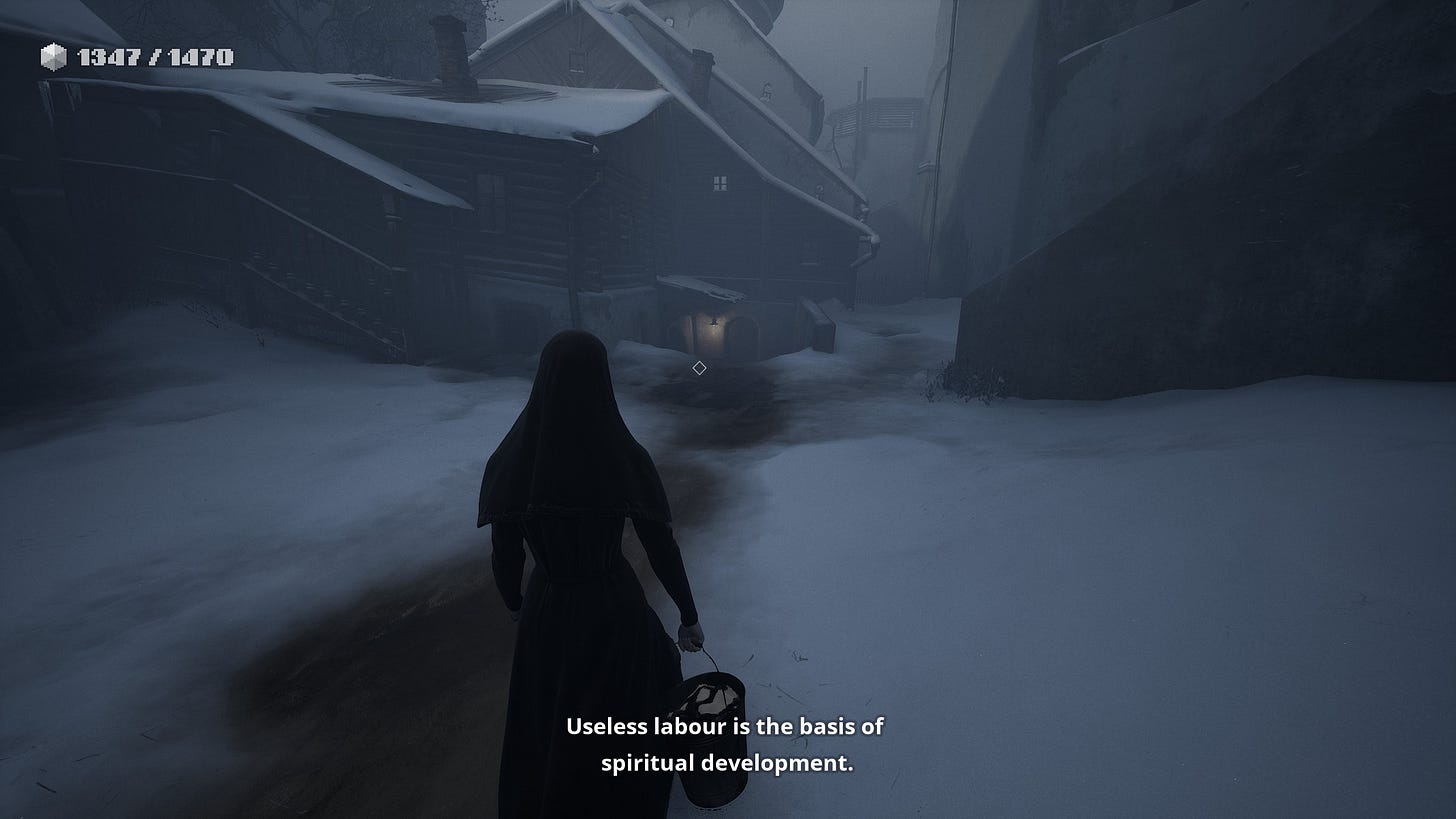Most games aren't super into exploring religion. When they do they do it in a very removed fashion, usually refusing to examine Christianity as it's this revered topic in much of the Western World, but every so often you get a game that's willing to explore themes that most games wouldn't touch with a 10 foot pole. Every once in a while you get a game like Indika.
Playing through Indika was a truly wonderful experience. One that I won't just cherish, but will think about for a long time over the next few months. I will likely be talking about it with my partner for at least an hour over the next week and they don't have religious trauma like I do, they weren't even raised religious like I had to go through. Indika was wonderful and you should play it.
The Premise
Indika is about a nun named Indika, of course, who goes on a journey after being given a task by her Monastery to deliver a letter to a priest at a different Monastery. It takes place in an alternate version of late 19th century Russia. Indika also happens to be hearing voices, specifically, the Devil. He does voice-over throughout the game and it's meant to examine religious ideas throughout the short story. As you go on your journey you meet Ilya, an escaped convict who believes he's been talking to God. You both go on the journey from there.
The Good

I was raised Catholic, sort of. I was only Catholic on my Dad's side and after my parents' divorce it became very apparent to me how flawed so much of religion is and how much disdain I have for it. I went to a Catholic school until High School when I finally went to a public school. I hated my school and it gave me tremendous religious trauma given that I am queer and they thought my very existence was a terrible blasphemous thing. Indika delves into this kind of experience, being on the outside of a religious community you are still a part of, from the get go. The voice over, who is the Devil, tells you that Indika is "loved" in the Christian way by her fellow nuns, but those fellow nuns in a "human sense" are disgusted with Indika. You can see it with the nuns wanting her gone. For instance, you come across a fellow nun, in the first section, who is having issues with a piece of machinery and Indika offers to help to which the nun says "get away" because everyone hates Indika. There's also, in the same section, a moment where Indika goes to pick up a basket of potatoes and when she gets there the nun that hands her the potatoes refuses to even engage or talk with Indika. She puts down the Potatoes and literally locks the door so Indika can't come in to continue talking to her. When Indika says "Thank you" after the door is locked you can feel the depression in her voice. You can feel how awful it is to be in her shoes. It's incredibly well done and shows what it's like to be in a religious community that has disdain for you and who you are in a very accurate fashion. It actually helped me re-examine my own past at the Catholic school I went to. It helped me process how religion influenced my last relationship since it was with such a religious individual. It helped me think. Helped me process my religious trauma and think about it in a new way. It was a wonderful experience.

One of the best parts of this game are the Devil talking to Indika where he questions sin and why it exists, he questions the whole system of religion. He aims to show that religion is flawed, that it doesn't make sense. One key part of him doing this is when he talks to Indika about opening a letter. He tries to quantify sin. So he asks if it is a sin to open a letter that is not yours, to which Indika says "..reading someone else's letter is a greater sin than not delivering it". The Devil asks how much greater, to which she says "twice as much". This goes on with the Devil trying to compare different sins and Indika says you can't compare them to which the Devil says "Why not? The priest imposes different penance for different sins". Then The Devil assumes that Stealing is ten times worse than not delivering a letter, then he expands to murder, where he says that murder is the same as not delivering 1000 letters, to which he says that "..if a postman were to lose a sack full of letters, we'd have a murderer". The quantification of sin, the dissecting it, trying to show how it is pointless and impossible to know what is and isn't a sin, how there are different contexts behind things, how sin is a flawed thing to judge something on. It even examines whether free will is a thing, how it works, if it works, and how choice works if God supposedly has a plan for us (this is a very Calvinist point). It talks about how Indika, believing she is saving Ilya's life, has gone further away from God, as if helping people can be a sin. It also talks about souls to which The Devil says "Soul this and soul that but can anyone clearly explain what it is?" The game goes through so much religious theory and examines it in such a wonderfully critical way. It examines what evil is, if evil even exists and it questions core tenants of Christianity and essentially shows how flawed they are. The questioning of religion and sin is a constant theme throughout the game and it is a wonderfully represented experience that really shows the flaws with religion. I adored it.

The story is rather interesting and has to do with everything I've already talked about and also how Indika ended up in the situation she's in. She "fell in love" with someone who wasn't the person she was arranged to be married to, they slept together, her dad killed him as the guy was stealing money from the shop the dad owned. This ended with her going to the Monastery to be a nun. This story is conveyed through little mini-games in between normal gameplay. It's a really interesting way to convey backstory as opposed to just telling you in exposition. The game has a story to tell, and it honestly has much less to do with Indika than it has to do with the philosophy behind her questioning God.
The Bad
Okay, I've talked about this in every single damn review of a game that does it (my Final Fantasy 7 Remake review, 1000xResist Review, and God of War Ragnarok review) and I still hate this. I am talking, of course, about slow walking. The game literally starts with this long section you can only slow walk through. I found myself furiously holding buttons trying to get myself to walk faster but it was pointless. Slow walking is a big problem for me and this game introduces you to it with a long section of slow walking. It is not a good first impression, despite having excellent atmosphere. Then it continues to do slow walking when following right behind Ilya and it's exhaustively frustrating. Just. Let. Me. Move. Faster. It is never fun to be forced to walk slowly, no matter what anyone says, it's a bad gameplay decision. Always.

The game left me frustrated in the mini-games that portray Indika's backstory, mainly just because I wasn't good at them. The game provides the ability to skip them, but I didn't want to. This lead to a small amount of frustration but it wasn't awful.
The game is just too damn short. That's, I think, a very big issue for it, I think it should have been at least a bit longer. I found myself wanting much more, which one could argue means the story is just damn good and the game is so unique that it leaves you on the hook, but, overall, it just needed to be longer, I finished it in an afternoon, it's super duper short.
The Ending
Indika ends up going to prison because Ilya went to the Temple and prayed, hoping his arm would reattach (said arm had been rotting since the beginning of the game and Indika chopped it off to try to save Ilya from dying to sepsis) and he'd be healed, which he wasn't, and with all this happening, the Priest was shot and Indika was blamed. There was a really interesting philosophical moment where Indika and the Devil are floating in a red abyss that is incredibly deep and challenges a lot of religion. So, she got taken to prison and only managed to escape by having sex with the guard and then the Devil knocked him over. Only it wasn't the Devil, it was Indika knocking over some piece of wood furniture. Then Indika escapes and runs to the pawn shop where she gets the Kudets to pray in front of. The pawn shop owner is distracted by Ilya being a dick and you are given the time to pray in front of it for free, and then given the option to shake it for as many points as you god damn want. You see Indika in the mirror, or you see the Devil in her place. Then after the shaking points out, and opening the Kudets revealing that it was only filled with pointless marbles, she finally sees herself in the mirror and then drops said marbles that she was holding. Then credits.
There's a small thing after the credits where you play Ilya before the story, it's in the pixelated format that the Indika backstories are told in. He's playing his guitar in the pub he talked about during the story, and does it terribly no matter how you do the tuning. That runs counter to how he portrayed himself as doing so well he got a standing ovation. Eventually he is thrown out and the game goes back to the main menu.
The ending felt, short. It represented that after everything she went through, she's become a new person. And it did all that very well and examined the philosophical ideas of God and the Devil and evil very effectively. It examines how faith can make you pray to some kind of object or Idol that holds special significance in order to change something about yourself and then once you realize that that object isn't doing anything to help you change and that it was simply empty all along, you have to rethink your life. That, once you realize how hollow the idol and the practice of faith can be you will become a new person. The ending has such deep representation for how faith is flawed and how realizing that it is inherently flawed gives us more power than we ever had when we were practicing the faith. I think I just wish there was a bit...more. It was a good ending though.
The Conclusion
Indika is a very short game, 3-4 hours, with a very deep and religious examination that makes it an ideal game for someone who has gone through religious trauma, I know it helped me process a lot and made me incredibly happy to see such a criticism in the art medium that I exist in. It's a wonderful examination of some really interesting concepts and I can't recommend it enough. I would definitely say though that you need to get it on sale, for a game that normally costs 25 dollars, I wouldn't pay anything above 15.

The experience left me wanting more, it left me examining my own experience with religion, it left me feeling like I needed to talk to someone who has gone through the questioning their religion phase. Unfortunately, I don't know anyone personally who has done that, but I wish I did because I think you could probably have such a long conversation about it that it would last longer than the game. It's a wonderful experience that anyone who is formerly religious should go through and experience thoroughly.
Meow,
Cat
P.S. If you liked this, you should totally check out my History of Queerness in Videogames series! Part 4, the last part, is this Friday so here are the links to part 1, 2, and 3.







